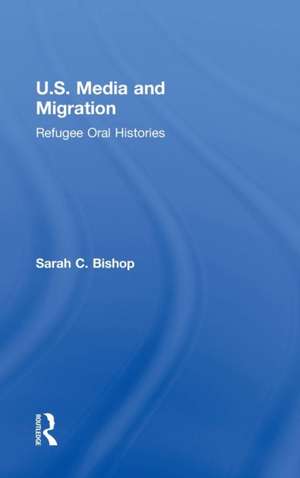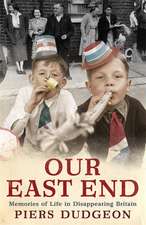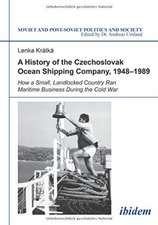U.S. Media and Migration: Refugee Oral Histories
Autor Sarah C. Bishopen Limba Engleză Hardback – 21 dec 2015
Using oral history, ethnography, and close readings of media, Sarah C. Bishop probes the myriad and sometimes conflicting ways refugees interpret and use mediated representations of life in the United States. Guided by 74 refugee narrators from Bhutan, Burma, Iraq, and Somalia, U.S. Media and Migration explores answers to questions such as: What does one learn from media about an unfamiliar place? How does media help or hinder refugees' sense of belonging after relocation? And how does the U.S. government use media to shape refugees' understanding of American norms, standards, and ideals? With insights from refugees and resettlement administrators throughout, Bishop provides a compelling and layered analysis of the interaction between refugees and U.S. media before, during, and long after resettlement.
| Toate formatele și edițiile | Preț | Express |
|---|---|---|
| Paperback (1) | 370.35 lei 6-8 săpt. | |
| Taylor & Francis – 22 dec 2015 | 370.35 lei 6-8 săpt. | |
| Hardback (1) | 1053.92 lei 6-8 săpt. | |
| Taylor & Francis – 21 dec 2015 | 1053.92 lei 6-8 săpt. |
Preț: 1053.92 lei
Preț vechi: 1285.26 lei
-18% Nou
Puncte Express: 1581
Preț estimativ în valută:
201.66€ • 211.15$ • 167.27£
201.66€ • 211.15$ • 167.27£
Carte tipărită la comandă
Livrare economică 10-24 aprilie
Preluare comenzi: 021 569.72.76
Specificații
ISBN-13: 9781138947467
ISBN-10: 1138947466
Pagini: 222
Dimensiuni: 152 x 229 x 14 mm
Greutate: 0.47 kg
Ediția:1
Editura: Taylor & Francis
Colecția Routledge
Locul publicării:Oxford, United Kingdom
ISBN-10: 1138947466
Pagini: 222
Dimensiuni: 152 x 229 x 14 mm
Greutate: 0.47 kg
Ediția:1
Editura: Taylor & Francis
Colecția Routledge
Locul publicării:Oxford, United Kingdom
Public țintă
Postgraduate and UndergraduateCuprins
Introduction 1. Refugees as Audiences of US Media in Pre-Arrival Contexts 2. Refugees' Use of Media in Pre-Departure Preparation and Orientations 3. Voluntary and Mandated Media Encounters During Refugees' First Days in the US 4. Media and Refugees' Ongoing Resettlement 5. Conclusion
Recenzii
"As the world watches with incredulity and shame the harrowing experiences of the latest wave of refugees and national governments do little to respond humanely, US Media and Migration is a timely work. It provides an original and insightful analysis of refugee media use/influence and does so before, during and after their arrival in the U.S. Importantly, it also forefronts the voices of the refugees themselves. Highly recommended." -Simon Cottle, Cardiff University, author of Global Crisis Reporting
"Sarah C. Bishop offers a nuanced, well-thought, critical, highly readable and timely analysis of the role of communication, culture, and imagination in one of the most significant processes at work in today’s global context: the complex and multivaried encounter between migrants’ expectations of their life in the West, and the West’s assumption of what they are and what they are supposed to turn into as they pass through the "pressure cooker" of normative Westernization." –Alessandro Portelli, University of Rome, La Sapienza
"U.S. Media and Migration is a must read. Underprivileged migration will be on the biggest social problems of this century, and Sarah C. Bishop successfully illustrates how media will play an important role in working on this problem. The 74 interviews with refugees are a great treasure. In this book, Bishop has given these migrants a voice and presence." –Joachim Trebbe, Free University of Berlin
"U.S. Media and Migration examines the ways in which refugees use and interpret multiple forms of US media before, during, and after their relocation to the US. Using firsthand narratives from refugees and refugee settlement administrators, the author demonstrates the significance of mediated discourses in refugees' 'enculturation' to US culture and their understanding of their new home. The text brings to light not only the popular media that refugees engage with but also the media created and sanctioned by the US government that they encounter in their various stages of relocation. Overall, the book advances knowledge of 'media's power and limitations in transnational contexts.' By focusing on refugees (underprivileged, involuntary immigrants), Bishop (CUNY Baruch College) proffers a corrective to the lack of attention given to forced migration in American immigration scholarship. Furthermore, by using firsthand accounts of refugees from Bhutan, Burma, Iraq, and Somalia, the text foregrounds the voices of otherwise marginalized immigrants and situates them as a rich source of knowledge about immigration processes. The straightforward nature of the author's writing and arguments makes the book accessible to and appropriate for lower- and upper-level undergraduate students."-K. Gentles-Peart, Roger Williams University
"Sarah C. Bishop offers a nuanced, well-thought, critical, highly readable and timely analysis of the role of communication, culture, and imagination in one of the most significant processes at work in today’s global context: the complex and multivaried encounter between migrants’ expectations of their life in the West, and the West’s assumption of what they are and what they are supposed to turn into as they pass through the "pressure cooker" of normative Westernization." –Alessandro Portelli, University of Rome, La Sapienza
"U.S. Media and Migration is a must read. Underprivileged migration will be on the biggest social problems of this century, and Sarah C. Bishop successfully illustrates how media will play an important role in working on this problem. The 74 interviews with refugees are a great treasure. In this book, Bishop has given these migrants a voice and presence." –Joachim Trebbe, Free University of Berlin
"U.S. Media and Migration examines the ways in which refugees use and interpret multiple forms of US media before, during, and after their relocation to the US. Using firsthand narratives from refugees and refugee settlement administrators, the author demonstrates the significance of mediated discourses in refugees' 'enculturation' to US culture and their understanding of their new home. The text brings to light not only the popular media that refugees engage with but also the media created and sanctioned by the US government that they encounter in their various stages of relocation. Overall, the book advances knowledge of 'media's power and limitations in transnational contexts.' By focusing on refugees (underprivileged, involuntary immigrants), Bishop (CUNY Baruch College) proffers a corrective to the lack of attention given to forced migration in American immigration scholarship. Furthermore, by using firsthand accounts of refugees from Bhutan, Burma, Iraq, and Somalia, the text foregrounds the voices of otherwise marginalized immigrants and situates them as a rich source of knowledge about immigration processes. The straightforward nature of the author's writing and arguments makes the book accessible to and appropriate for lower- and upper-level undergraduate students."-K. Gentles-Peart, Roger Williams University
Notă biografică
Sarah C. Bishop is an Assistant Professor in the Department of Communication Studies at Baruch College, City University of New York. Bishop’s research considers the interaction of media and migration. Much of her published work pertains to the ways immigrants, refugees, and sojourners use and are portrayed in media throughout intercultural transitions. At Baruch, Bishop teaches a range of undergraduate and graduate courses in Intercultural Communication, Privilege and Difference, and Digital Media Culture.
Descriere
Using oral history, ethnography, and close readings of media texts, Sarah C. Bishop probes the myriad and sometimes conflicting ways refugees interpret and use mediated representations of life in America. Guided by seventy-four different narrators from Bhutan, Burma, Iraq and Somalia, US Media and Migration explores answers to questions such as: What does one learn from media about an unfamiliar place? How does media help or hinder refugees' sense of belonging after relocation? And, how does the US government use media to shape refugees' understanding of American norms, standards, and ideals? Through interviews with both refugees and resettlement administrators, Bishop provides a compelling and layered analysis of the interaction between refugees and US media before, during, and long after resettlement.

















